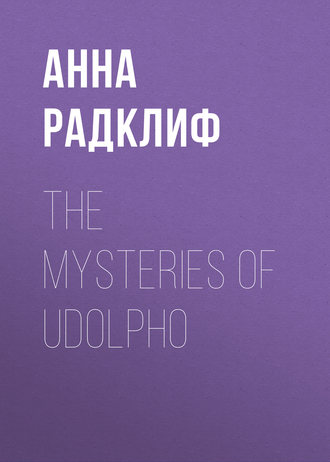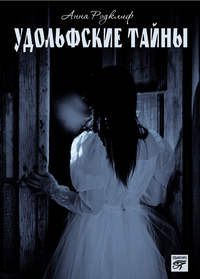 полная версия
полная версияThe Mysteries of Udolpho
Emily was surprised and alarmed, at the secrecy which this man seemed to think so necessary, and hesitated whether to meet him, till, considering, that he might mean to warn her of some serious danger, she resolved to go.
'Soon after sun-set,' said she, 'I will be at the end of the east rampart. But then the watch will be set,' she added, recollecting herself, 'and how can Barnardine pass unobserved?'
'That is just what I said to him, ma'am, and he answered me, that he had the key of the gate, at the end of the rampart, that leads towards the courts, and could let himself through that way; and as for the sentinels, there were none at this end of the terrace, because the place is guarded enough by the high walls of the castle, and the east turret; and he said those at the other end were too far off to see him, if it was pretty duskyish.'
'Well,' said Emily, 'I must hear what he has to tell; and, therefore, desire you will go with me to the terrace, this evening.'
'He desired it might be pretty duskyish, ma'amselle,' repeated Annette, 'because of the watch.'
Emily paused, and then said she would be on the terrace, an hour after sun-set;—'and tell Barnardine,' she added, 'to be punctual to the time; for that I, also, may be observed by Signor Montoni. Where is the Signor? I would speak with him.'
'He is in the cedar chamber, ma'am, counselling with the other Signors. He is going to give them a sort of treat to-day, to make up for what passed at the last, I suppose; the people are all very busy in the kitchen.'
Emily now enquired, if Montoni expected any new guests? and Annette believed that he did not. 'Poor Ludovico!' added she, 'he would be as merry as the best of them, if he was well; but he may recover yet. Count Morano was wounded as bad, as he, and he is got well again, and is gone back to Venice.'
'Is he so?' said Emily, 'when did you hear this?'
'I heard it, last night, ma'amselle, but I forgot to tell it.'
Emily asked some further questions, and then, desiring Annette would observe and inform her, when Montoni was alone, the girl went to deliver her message to Barnardine.
Montoni was, however, so much engaged, during the whole day, that Emily had no opportunity of seeking a release from her terrible suspense, concerning her aunt. Annette was employed in watching his steps, and in attending upon Ludovico, whom she, assisted by Caterina, nursed with the utmost care; and Emily was, of course, left much alone. Her thoughts dwelt often on the message of the porter, and were employed in conjecturing the subject, that occasioned it, which she sometimes imagined concerned the fate of Madame Montoni; at others, that it related to some personal danger, which threatened herself. The cautious secrecy which Barnardine observed in his conduct, inclined her to believe the latter.
As the hour of appointment drew near, her impatience increased. At length, the sun set; she heard the passing steps of the sentinels going to their posts; and waited only for Annette to accompany her to the terrace, who, soon after, came, and they descended together. When Emily expressed apprehensions of meeting Montoni, or some of his guests, 'O, there is no fear of that, ma'amselle,' said Annette, 'they are all set in to feasting yet, and that Barnardine knows.'
They reached the first terrace, where the sentinels demanded who passed; and Emily, having answered, walked on to the east rampart, at the entrance of which they were again stopped; and, having again replied, were permitted to proceed. But Emily did not like to expose herself to the discretion of these men, at such an hour; and, impatient to withdraw from the situation, she stepped hastily on in search of Barnardine. He was not yet come. She leaned pensively on the wall of the rampart, and waited for him. The gloom of twilight sat deep on the surrounding objects, blending in soft confusion the valley, the mountains, and the woods, whose tall heads, stirred by the evening breeze, gave the only sounds, that stole on silence, except a faint, faint chorus of distant voices, that arose from within the castle.
'What voices are those?' said Emily, as she fearfully listened.
'It is only the Signor and his guests, carousing,' replied Annette.
'Good God!' thought Emily, 'can this man's heart be so gay, when he has made another being so wretched; if, indeed, my aunt is yet suffered to feel her wretchedness? O! whatever are my own sufferings, may my heart never, never be hardened against those of others!'
She looked up, with a sensation of horror, to the east turret, near which she then stood; a light glimmered through the grates of the lower chamber, but those of the upper one were dark. Presently, she perceived a person moving with a lamp across the lower room; but this circumstance revived no hope, concerning Madame Montoni, whom she had vainly sought in that apartment, which had appeared to contain only soldiers' accoutrements. Emily, however, determined to attempt the outer door of the turret, as soon as Barnardine should withdraw; and, if it was unfastened, to make another effort to discover her aunt.
The moments passed, but still Barnardine did not appear; and Emily, becoming uneasy, hesitated whether to wait any longer. She would have sent Annette to the portal to hasten him, but feared to be left alone, for it was now almost dark, and a melancholy streak of red, that still lingered in the west, was the only vestige of departed day. The strong interest, however, which Barnardine's message had awakened, overcame other apprehensions, and still detained her.
While she was conjecturing with Annette what could thus occasion his absence, they heard a key turn in the lock of the gate near them, and presently saw a man advancing. It was Barnardine, of whom Emily hastily enquired what he had to communicate, and desired, that he would tell her quickly, 'for I am chilled with this evening air,' said she.
'You must dismiss your maid, lady,' said the man in a voice, the deep tone of which shocked her, 'what I have to tell is to you only.'
Emily, after some hesitation, desired Annette to withdraw to a little distance. 'Now, my friend, what would you say?'
He was silent a moment, as if considering, and then said,—
'That which would cost me my place, at least, if it came to the Signor's ears. You must promise, lady, that nothing shall ever make you tell a syllable of the matter; I have been trusted in this affair, and, if it was known, that I betrayed my trust, my life, perhaps, might answer it. But I was concerned for you, lady, and I resolved to tell you.' He paused.—
Emily thanked him, assured him that he might repose on her discretion, and entreated him to dispatch.
'Annette told us in the hall how unhappy you was about Signora Montoni, and how much you wished to know what was become of her.'
'Most true,' said Emily eagerly, 'and you can inform me. I conjure you tell me the worst, without hesitation.' She rested her trembling arm upon the wall.
'I can tell you,' said Barnardine, and paused.—
Emily had no power to enforce her entreaties.
'I CAN tell you,' resumed Barnardine,—'but'—
'But what?' exclaimed Emily, recovering her resolution.
'Here I am, ma'amselle,' said Annette, who, having heard the eager tone, in which Emily pronounced these words, came running towards her.
'Retire!' said Barnardine, sternly; 'you are not wanted;' and, as Emily said nothing, Annette obeyed.
'I CAN tell you,' repeated the porter,—'but I know not how—you was afflicted before.'—
'I am prepared for the worst, my friend,' said Emily, in a firm and solemn voice. 'I can support any certainty better than this suspense.'
'Well, Signora, if that is the case, you shall hear.—You know, I suppose, that the Signor and his lady used sometimes to disagree. It is none of my concerns to enquire what it was about, but I believe you know it was so.'
'Well,' said Emily, 'proceed.'
'The Signor, it seems, had lately been very wrath against her. I saw all, and heard all,—a great deal more than people thought for; but it was none of my business, so I said nothing. A few days ago, the Signor sent for me. "Barnardine," says he, "you are—an honest man, I think I can trust you." I assured his excellenza that he could. "Then," says he, as near as I can remember, "I have an affair in hand, which I want you to assist me in."—Then he told me what I was to do; but that I shall say nothing about—it concerned only the Signora.'
'O Heavens!' exclaimed Emily—'what have you done?'
Barnardine hesitated, and was silent.
'What fiend could tempt him, or you, to such an act!' cried Emily, chilled with horror, and scarcely able to support her fainting spirits.
'It was a fiend,' said Barnardine in a gloomy tone of voice. They were now both silent;—Emily had not courage to enquire further, and Barnardine seemed to shrink from telling more. At length he said, 'It is of no use to think of the past; the Signor was cruel enough, but he would be obeyed. What signified my refusing? He would have found others, who had no scruples.'
'You have murdered her, then!' said Emily, in a hollow and inward voice—'I am talking with a murderer!' Barnardine stood silent; while Emily turned from him, and attempted to leave the place.
'Stay, lady!' said he, 'You deserve to think so still—since you can believe me capable of such a deed.'
'If you are innocent, tell me quickly,' said Emily, in faint accents, 'for I feel I shall not be able to hear you long.'
'I will tell you no more,' said he, and walked away. Emily had just strength enough to bid him stay, and then to call Annette, on whose arm she leaned, and they walked slowly up the rampart, till they heard steps behind them. It was Barnardine again.
'Send away the girl,' said he, 'and I will tell you more.'
'She must not go,' said Emily; 'what you have to say, she may hear.'
'May she so, lady?' said he. 'You shall know no more, then;' and he was going, though slowly, when Emily's anxiety, overcoming the resentment and fear, which the man's behaviour had roused, she desired him to stay, and bade Annette retire.
'The Signora is alive,' said he, 'for me. She is my prisoner, though; his excellenza has shut her up in the chamber over the great gates of the court, and I have the charge of her. I was going to have told you, you might see her—but now—'
Emily, relieved from an unutterable load of anguish by this speech, had now only to ask Barnardine's forgiveness, and to conjure, that he would let her visit her aunt.
He complied with less reluctance, than she expected, and told her, that, if she would repair, on the following night, when the Signor was retired to rest, to the postern-gate of the castle, she should, perhaps, see Madame Montoni.
Amid all the thankfulness, which Emily felt for this concession, she thought she observed a malicious triumph in his manner, when he pronounced the last words; but, in the next moment, she dismissed the thought, and, having again thanked him, commended her aunt to his pity, and assured him, that she would herself reward him, and would be punctual to her appointment, she bade him good night, and retired, unobserved, to her chamber. It was a considerable time, before the tumult of joy, which Barnardine's unexpected intelligence had occasioned, allowed Emily to think with clearness, or to be conscious of the real dangers, that still surrounded Madame Montoni and herself. When this agitation subsided, she perceived, that her aunt was yet the prisoner of a man, to whose vengeance, or avarice, she might fall a sacrifice; and, when she further considered the savage aspect of the person, who was appointed to guard Madame Montoni, her doom appeared to be already sealed, for the countenance of Barnardine seemed to bear the stamp of a murderer; and, when she had looked upon it, she felt inclined to believe, that there was no deed, however black, which he might not be prevailed upon to execute. These reflections brought to her remembrance the tone of voice, in which he had promised to grant her request to see his prisoner; and she mused upon it long in uneasiness and doubt. Sometimes, she even hesitated, whether to trust herself with him at the lonely hour he had appointed; and once, and only once, it struck her, that Madame Montoni might be already murdered, and that this ruffian was appointed to decoy herself to some secret place, where her life also was to be sacrificed to the avarice of Montoni, who then would claim securely the contested estates in Languedoc. The consideration of the enormity of such guilt did, at length, relieve her from the belief of its probability, but not from all the doubts and fears, which a recollection of Barnardine's manner had occasioned. From these subjects, her thoughts, at length, passed to others; and, as the evening advanced, she remembered, with somewhat more than surprise, the music she had heard, on the preceding night, and now awaited its return, with more than curiosity.
She distinguished, till a late hour, the distant carousals of Montoni and his companions—the loud contest, the dissolute laugh and the choral song, that made the halls re-echo. At length, she heard the heavy gates of the castle shut for the night, and those sounds instantly sunk into a silence, which was disturbed only by the whispering steps of persons, passing through the galleries to their remote rooms. Emily now judging it to be about the time, when she had heard the music, on the preceding night, dismissed Annette, and gently opened the casement to watch for its return. The planet she had so particularly noticed, at the recurrence of the music, was not yet risen; but, with superstitious weakness, she kept her eyes fixed on that part of the hemisphere, where it would rise, almost expecting, that, when it appeared, the sounds would return. At length, it came, serenely bright, over the eastern towers of the castle. Her heart trembled, when she perceived it, and she had scarcely courage to remain at the casement, lest the returning music should confirm her terror, and subdue the little strength she yet retained. The clock soon after struck one, and, knowing this to be about the time, when the sounds had occurred, she sat down in a chair, near the casement, and endeavoured to compose her spirits; but the anxiety of expectation yet disturbed them. Every thing, however, remained still; she heard only the solitary step of a sentinel, and the lulling murmur of the woods below, and she again leaned from the casement, and again looked, as if for intelligence, to the planet, which was now risen high above the towers.
Emily continued to listen, but no music came. 'Those were surely no mortal sounds!' said she, recollecting their entrancing melody. 'No inhabitant of this castle could utter such; and, where is the feeling, that could modulate such exquisite expression? We all know, that it has been affirmed celestial sounds have sometimes been heard on earth. Father Pierre and Father Antoine declared, that they had sometimes heard them in the stillness of night, when they alone were waking to offer their orisons to heaven. Nay, my dear father himself, once said, that, soon after my mother's death, as he lay watchful in grief, sounds of uncommon sweetness called him from his bed; and, on opening his window, he heard lofty music pass along the midnight air. It soothed him, he said; he looked up with confidence to heaven, and resigned her to his God.'
Emily paused to weep at this recollection. 'Perhaps,' resumed she, 'perhaps, those strains I heard were sent to comfort,—to encourage me! Never shall I forget those I heard, at this hour, in Languedoc! Perhaps, my father watches over me, at this moment!' She wept again in tenderness. Thus passed the hour in watchfulness and solemn thought; but no sounds returned; and, after remaining at the casement, till the light tint of dawn began to edge the mountain-tops and steal upon the night-shade, she concluded, that they would not return, and retired reluctantly to repose.
VOLUME 3
CHAPTER I
I will advise you where to plant yourselves;Acquaint you with the perfect spy o' the time,The moment on 't; for 't must be done to-night.MACBETHEmily was somewhat surprised, on the following day, to find that Annette had heard of Madame Montoni's confinement in the chamber over the portal, as well as of her purposed visit there, on the approaching night. That the circumstance, which Barnardine had so solemnly enjoined her to conceal, he had himself told to so indiscreet an hearer as Annette, appeared very improbable, though he had now charged her with a message, concerning the intended interview. He requested, that Emily would meet him, unattended, on the terrace, at a little after midnight, when he himself would lead her to the place he had promised; a proposal, from which she immediately shrunk, for a thousand vague fears darted athwart her mind, such as had tormented her on the preceding night, and which she neither knew how to trust, or to dismiss. It frequently occurred to her, that Barnardine might have deceived her, concerning Madame Montoni, whose murderer, perhaps, he really was; and that he had deceived her by order of Montoni, the more easily to draw her into some of the desperate designs of the latter. The terrible suspicion, that Madame Montoni no longer lived, thus came, accompanied by one not less dreadful for herself. Unless the crime, by which the aunt had suffered, was instigated merely by resentment, unconnected with profit, a motive, upon which Montoni did not appear very likely to act, its object must be unattained, till the niece was also dead, to whom Montoni knew that his wife's estates must descend. Emily remembered the words, which had informed her, that the contested estates in France would devolve to her, if Madame Montoni died, without consigning them to her husband, and the former obstinate perseverance of her aunt made it too probable, that she had, to the last, withheld them. At this instant, recollecting Barnardine's manner, on the preceding night, she now believed, what she had then fancied, that it expressed malignant triumph. She shuddered at the recollection, which confirmed her fears, and determined not to meet him on the terrace. Soon after, she was inclined to consider these suspicions as the extravagant exaggerations of a timid and harassed mind, and could not believe Montoni liable to such preposterous depravity as that of destroying, from one motive, his wife and her niece. She blamed herself for suffering her romantic imagination to carry her so far beyond the bounds of probability, and determined to endeavour to check its rapid flights, lest they should sometimes extend into madness. Still, however, she shrunk from the thought of meeting Barnardine, on the terrace, at midnight; and still the wish to be relieved from this terrible suspense, concerning her aunt, to see her, and to sooth her sufferings, made her hesitate what to do.
'Yet how is it possible, Annette, I can pass to the terrace at that hour?' said she, recollecting herself, 'the sentinels will stop me, and Signor Montoni will hear of the affair.'
'O ma'amselle! that is well thought of,' replied Annette. 'That is what Barnardine told me about. He gave me this key, and bade me say it unlocks the door at the end of the vaulted gallery, that opens near the end of the east rampart, so that you need not pass any of the men on watch. He bade me say, too, that his reason for requesting you to come to the terrace was, because he could take you to the place you want to go to, without opening the great doors of the hall, which grate so heavily.'
Emily's spirits were somewhat calmed by this explanation, which seemed to be honestly given to Annette. 'But why did he desire I would come alone, Annette?' said she.
'Why that was what I asked him myself, ma'amselle. Says I, Why is my young lady to come alone?—Surely I may come with her!—What harm can I do? But he said "No—no—I tell you not," in his gruff way. Nay, says I, I have been trusted in as great affairs as this, I warrant, and it's a hard matter if I can't keep a secret now. Still he would say nothing but—"No—no—no." Well, says I, if you will only trust me, I will tell you a great secret, that was told me a month ago, and I have never opened my lips about it yet—so you need not be afraid of telling me. But all would not do. Then, ma'amselle, I went so far as to offer him a beautiful new sequin, that Ludovico gave me for a keep sake, and I would not have parted with it for all St. Marco's Place; but even that would not do! Now what can be the reason of this? But I know, you know, ma'am, who you are going to see.'
'Pray did Barnardine tell you this?'
'He! No, ma'amselle, that he did not.'
Emily enquired who did, but Annette shewed, that she COULD keep a secret.
During the remainder of the day, Emily's mind was agitated with doubts and fears and contrary determinations, on the subject of meeting this Barnardine on the rampart, and submitting herself to his guidance, she scarcely knew whither. Pity for her aunt and anxiety for herself alternately swayed her determination, and night came, before she had decided upon her conduct. She heard the castle clock strike eleven—twelve—and yet her mind wavered. The time, however, was now come, when she could hesitate no longer: and then the interest she felt for her aunt overcame other considerations, and, bidding Annette follow her to the outer door of the vaulted gallery, and there await her return, she descended from her chamber. The castle was perfectly still, and the great hall, where so lately she had witnessed a scene of dreadful contention, now returned only the whispering footsteps of the two solitary figures gliding fearfully between the pillars, and gleamed only to the feeble lamp they carried. Emily, deceived by the long shadows of the pillars and by the catching lights between, often stopped, imagining she saw some person, moving in the distant obscurity of the perspective; and, as she passed these pillars, she feared to turn her eyes toward them, almost expecting to see a figure start out from behind their broad shaft. She reached, however, the vaulted gallery, without interruption, but unclosed its outer door with a trembling hand, and, charging Annette not to quit it and to keep it a little open, that she might be heard if she called, she delivered to her the lamp, which she did not dare to take herself because of the men on watch, and, alone, stepped out upon the dark terrace. Every thing was so still, that she feared, lest her own light steps should be heard by the distant sentinels, and she walked cautiously towards the spot, where she had before met Barnardine, listening for a sound, and looking onward through the gloom in search of him. At length, she was startled by a deep voice, that spoke near her, and she paused, uncertain whether it was his, till it spoke again, and she then recognized the hollow tones of Barnardine, who had been punctual to the moment, and was at the appointed place, resting on the rampart wall. After chiding her for not coming sooner, and saying, that he had been waiting nearly half an hour, he desired Emily, who made no reply, to follow him to the door, through which he had entered the terrace.
While he unlocked it, she looked back to that she had left, and, observing the rays of the lamp stream through a small opening, was certain, that Annette was still there. But her remote situation could little befriend Emily, after she had quitted the terrace; and, when Barnardine unclosed the gate, the dismal aspect of the passage beyond, shewn by a torch burning on the pavement, made her shrink from following him alone, and she refused to go, unless Annette might accompany her. This, however, Barnardine absolutely refused to permit, mingling at the same time with his refusal such artful circumstances to heighten the pity and curiosity of Emily towards her aunt, that she, at length, consented to follow him alone to the portal.
He then took up the torch, and led her along the passage, at the extremity of which he unlocked another door, whence they descended, a few steps, into a chapel, which, as Barnardine held up the torch to light her, Emily observed to be in ruins, and she immediately recollected a former conversation of Annette, concerning it, with very unpleasant emotions. She looked fearfully on the almost roofless walls, green with damps, and on the gothic points of the windows, where the ivy and the briony had long supplied the place of glass, and ran mantling among the broken capitals of some columns, that had once supported the roof. Barnardine stumbled over the broken pavement, and his voice, as he uttered a sudden oath, was returned in hollow echoes, that made it more terrific. Emily's heart sunk; but she still followed him, and he turned out of what had been the principal aisle of the chapel. 'Down these steps, lady,' said Barnardine, as he descended a flight, which appeared to lead into the vaults; but Emily paused on the top, and demanded, in a tremulous tone, whither he was conducting her.









